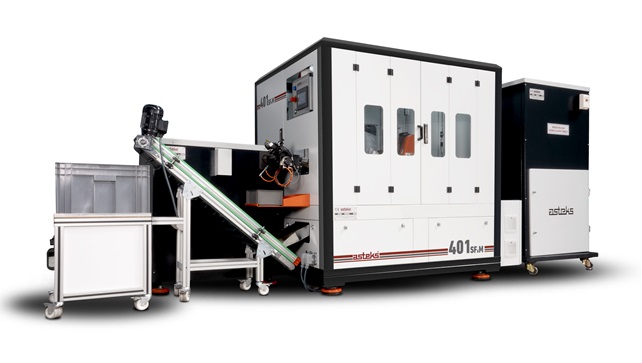Equipped with high efficiency and advanced automation features, Asteks’ innovative 401-SF series cots grinding machines are taking their place in more and more spinning mills every day. Türkiye’s two leading textile companies, Kaynak İplik and Grand İplik, preferred 401-SF in the cots grinding process.
Asteks, a leading manufacturer of cots grinding and automation solutions, continues increasing its power in Türkiye and the global market with the technologies that have been developed through intensive R&D. The latest generation 401 Series cots grinding machines provide substantial advantages to yarn manufacturers in cots grinding with their high automation capability and superior efficiency, meanwhile drawing attention with their sales figures. The 401-SF and 401-SF&M models in the series have managed to attract the attention of yarn manufacturers in both Türkiye and important textile regions of the global market since the day they were introduced to the market. Finally, at the ITM 2024 textile machinery exhibition held in June 2024, Kaynak İplik and Grand İplik, two of Türkiye’s leading textile manufacturers, also strengthened their cots grinding departments with new 401 models. Both companies underlined their trust in Asteks and Asteks solutions at the ceremony held at the exhibition.
Stating that they have strong ties with both Kaynak İplik and Grand İplik and that they carry out a comprehensive cooperation in terms of developing new solutions, Asteks Marketing and Sales Manager Sabri İlknur emphasized that the 401-SF series cots grinding machines, a product of Turkish engineering, offer many advantages to users with their advanced functional features. İlknur said the following:
The 401-SF series was developed by our own R&D department, considering the demands and expectations of yarn manufacturers in cots grinding. Therefore, we are talking about a solution that is future-oriented. It is equipped with features that will prevent possible process errors, quality losses and operating cost problems thanks to more automation and digital processes. Without trying to arrange numerous cots, the grinding process can be started by simply pouring them into the feeding chamber. In short, the 401-SF cots grinding machines have become one of the first solutions preferred by yarn manufacturers today thanks to their smart feeding system with chamber, laser diameter measurement system and automatic grinding system. We would like to thank Kaynak İplik and Grand İplik for preferring Asteks and for the trust they have in us.”
Kaynak İplik, increasing capacity, found the cots grinding solution they were looking for in Asteks
Kaynak İplik, a subsidiary of Kaynak Group located in Denizli centre and established in Uşak, produces yarns from cotton fibre with the latest technologies in high quality and offers them to domestic and international markets, in a highly quality oriented manner. The facility has a total area of 290 thousand m2; 90 thousand m2 of which is closed area, and also meets the needs of the towel, bathrobe, fabric and apparel factories within the group. Nearing the completion of its 9000-kW installed power SPP investment, Kaynak İplik invested in Asteks 401-SF for a more efficient and higher capacity of cots grinding solution in parallel with the capacity increase in their spinning facility.
 Kaynak İplik Factory Manager Mehmet Hüsamettin İnal said that they decided to invest in the 401-SF cots grinding machine due to its advanced automation and high capacity features. İnal; “We have started the additional investment process for increasing production and quality as of the beginning of 2024. In this context, we started looking for a more efficient and precise cots grinding machine to use in our Kaynak 1, Kaynak 2 and Kaynak 3 factories that produce high-quality compact and open-end yarns, and as a result, we purchased Asteks’ 401-SF machine and added it to our lines. All the relevant details that should be on a cots grinding machine have been considered and applied, and thanks to this, we continue to gain advantages in the operating process as well as in the investment process.”
Kaynak İplik Factory Manager Mehmet Hüsamettin İnal said that they decided to invest in the 401-SF cots grinding machine due to its advanced automation and high capacity features. İnal; “We have started the additional investment process for increasing production and quality as of the beginning of 2024. In this context, we started looking for a more efficient and precise cots grinding machine to use in our Kaynak 1, Kaynak 2 and Kaynak 3 factories that produce high-quality compact and open-end yarns, and as a result, we purchased Asteks’ 401-SF machine and added it to our lines. All the relevant details that should be on a cots grinding machine have been considered and applied, and thanks to this, we continue to gain advantages in the operating process as well as in the investment process.”
Informing that there are 88032 spindles in total in 4 spinning factories and that they produce 36 tons of yarn with an average of Ne 40/1 per day, he continued his words saying; “Our high volume spindle number reveals our need for a continuously operating and efficient cots grinding machine. Therefore, our cooperation with Asteks, which has been continuing for many years through aprons and cots purchases, has become even stronger with the purchase of the new generation cots grinding machine. In addition to the high automation and efficiency-oriented functional features of the machine, it is also very important to know that Asteks can always provide us complete support in terms of fast service and spare parts, in full. Before the purchase, we were also very impressed by the fact that the company officials visited our facility, inspected our operation and advised us to decide on exactly what we needed. I would like to thank them for this kind of technical supervision. I also must state the trust that Asteks provides by standing behind its machine with its service power, because the right partner is very important in a long-term investment. Asteks is the right partner for us.”
Grand İplik has found a profitable grinding solution in 401-SF&M
Grand İplik, an initiative of Grand Halı, was established in Gaziantep in 1998 and produces machine-made carpets in its integrated facility with a total area of approximately 78 thousand square meters; it started its operations in Şanlıurfa Eyyübiye Organized Industrial Zone in 2024. Grand İplik also addresses the market with its compact combed cotton yarn product range through its investment in cotton spinning and exports 95% of its yarn production to more than 60 countries.
 Grand İplik Factory Manager Devlet Kayar said that they are efficiency and quality-focused in the spinning investment they started based on their deep-rooted history in the industry. Kayar disclosed: “Cots grinding has an important role for quality and efficiency in yarn production. Regular and high-quality grinding process applied on to cots directly affect spinning efficiency and quality, and also reflects positively on operating costs. For this reason, we preferred Asteks’ 401-SF&M grinding machine. The compact structure of this machine, which offers all cots grinding solutions together, impressed us a lot. While processing the short cots for ring spinning and roving frames on the first grinding head, we can also process the long cots for draw frames and combing machines on the second grinding head located on the other side of the machine, simultaneously. With 401-SF&M, we have the chance to grind two different types of the cots at the same time in a fast, practical and profitable way, by its independently driven two grinding units smartly designed in one body.”
Grand İplik Factory Manager Devlet Kayar said that they are efficiency and quality-focused in the spinning investment they started based on their deep-rooted history in the industry. Kayar disclosed: “Cots grinding has an important role for quality and efficiency in yarn production. Regular and high-quality grinding process applied on to cots directly affect spinning efficiency and quality, and also reflects positively on operating costs. For this reason, we preferred Asteks’ 401-SF&M grinding machine. The compact structure of this machine, which offers all cots grinding solutions together, impressed us a lot. While processing the short cots for ring spinning and roving frames on the first grinding head, we can also process the long cots for draw frames and combing machines on the second grinding head located on the other side of the machine, simultaneously. With 401-SF&M, we have the chance to grind two different types of the cots at the same time in a fast, practical and profitable way, by its independently driven two grinding units smartly designed in one body.”
Kayar stated that with the 401-SF&M cots grinding model, the operators no longer have to manually feed the cots into the process one by one, and expressed that thanks to the automatic feeding system, time and labor are saved in the operation. He also drew attention to the fact that the standardization in the process is maintained thanks to the auto rejection function by laser diameter measurement which is part of smart feeding system automation. Kayar noted: “Asteks, as a Turkish company, has added significant value to the industry by developing a local and national technology. In addition, when compared to its local and foreign counterparts, they have achieved a superior solution both in terms of cost and technology. We have great confidence in Asteks, with whom we have been working for 20 years for rubber products such as aprons and cots. All these points were effective in our machine preference and we chose Asteks as our partner.”
He added that the 401-SF&M cots grinding machine that they added to their line, will meet the needs of approximately 24 thousand spindle ring spinning facilities in the first stage, and that it will meet the needs of a total of 60 thousand spindled spinning facilities once the second stage investment becomes operational.












